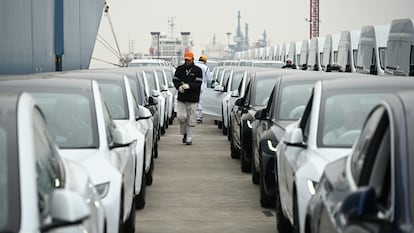The Trump effect no longer boosts Tesla: Stock drops by nearly a third since peak
Elon Musk is hoping to stem the decline, worsened by disappointing 2024 results, with his new autonomous car service

The close, almost familial relationship between Tesla CEO Elon Musk and the most powerful man in the world is no small matter when it comes to a company’s interests — especially when that man is Donald Trump, who is known for rewarding loyalty with personal favors and for not considering potential conflicts of interest.
However, when the spotlight fades and the campaign confetti settles, investors turn to the one place they can usually find certainty: the company’s income statement and future expectations. This is proving to be the biggest vulnerability of Tesla, the weakest link in the “Magnificent Seven” — Apple, Microsoft, Amazon, Alphabet, Meta, Nvidia, and Tesla. Now, the company is on the brink of exiting the trillion-dollar club.
Tesla has endured two months that it would prefer to forget. Since its peak on December 17, the stock price has lost 31.5% of its value, while the S&P 500 and the tech-heavy Nasdaq have remained virtually flat during the same period. This trend of underperformance, which already pushed Tesla into the red for 2025, accelerated following the release of disappointing results at the end of January. Total revenue grew by 2% in the fourth quarter, but it was only slightly positive thanks to its energy storage and generation business, while revenue from its vehicles dropped by 8%, a decline the company attributed to price cuts on its Model 3, Model Y, Model S, and Model X cars.
It’s hard to find any improving metrics. Over the past three months, earnings before interest and taxes (EBIT) totaled $1.58 billion, well below the consensus estimate of $2.7 billion, and the net margin was 6.2%, falling short of the expected 9.9%. Profit for 2024 dropped 53%, falling to $7.09 billion. This has led to a sharp downward adjustment of expectations. The profit forecast for 2025, based on the analysts' consensus compiled by Bloomberg, has been cut by 30%, from the $14.73 billion predicted 12 months ago to the current estimate of $10.24 billion. Revenue expectations have also been reduced by 14%, from $132.8 billion to the $113.47 billion now anticipated by the market.
The recalculation comes as Tesla trades at multiples far higher than its direct competitors. The stock is valued at 120 times projected 2025 earnings, compared to nine times for Toyota, six times for Ford, and four times for Volkswagen. Tesla’s market capitalization of just over $1 trillion is three times that of these three rivals combined. This indicates that the market still believes that Tesla’s growth potential is much greater. However, this demanding valuation — more typical of a start-up than a veteran company — leaves Tesla vulnerable to sharp declines if it fails to meet forecasts or faces unforeseen challenges.
The results were far from spectacular — in fact, quite the opposite — but they were enough to sustain the stock market rally, thanks to Musk’s promises of a more prosperous future. He painted a vision of an “epic” 2026 and “ridiculously good” 2027 and 2028, in his own words. A new business venture will play a key role in this optimistic outlook. Musk announced that, starting in June, Tesla will begin testing a paid service for its autonomous cars in Austin, Texas, where there are no regulations preventing it. By the end of the year, the service will expand to many regions across the U.S., with plans for nationwide operation by 2026.
While investors wait to see the returns on Tesla’s latest gamble, they’ve been focused on other troubling data. Tesla’s sales in Europe took a significant hit in January, with declines of 59% in Germany, 63% in France, 75% in Spain, 44% in Sweden, and 38% in Norway. What’s particularly concerning is that these drops occurred in a market that is growing overall, meaning Tesla is losing market share. In Germany, where Tesla has its only European factory, its market share has fallen from 14% to just 4%.
The reasons behind this decline remain unclear. Some analysts suggest the launch of the new Model Y, expected in the first half of the year, could be a factor. According to this theory, many customers may be delaying their purchase in anticipation of the new model rather than choosing from the current lineup. However, it’s difficult to believe this is the sole explanation. Others point to the reputational damage Tesla may be suffering due to Musk’s increasing political activism, which has cast a shadow over the company’s public image.
Musk’s support for Trump has propelled him to the head of the Department of Government Efficiency (DOGE), which is tasked with slashing federal spending as much as possible. However, as expected, the South African-born tycoon hasn’t confined himself to simply carrying out this work quietly. His political involvement has grown significantly week by week. The turning point came with his endorsement of the far-right AfD in the German elections on February 23, which included an interview with the party’s leader.
This increasing political activism, now extending beyond U.S. borders, has turned the Tesla leader into a polarizing figure. Musk still has a significant following, but the backlash against him is intensifying. On social media, this is reflected in the mass migration of users from the Musk-owned X to Bluesky. In the automotive industry, the impact could manifest in customers choosing rival brands instead.
In the green since Trump’s victory
Despite the recent poor performance, Tesla’s share price is still up more than 30% compared to its value before Trump’s election victory. This is positive news for those who invested earlier, but less so for those who jumped on the bandwagon more recently, as the “Trump effect” could continue to deflate if the autonomous car division fails to meet expectations.
The automotive industry won’t be immune to the effects of Trump’s trade policy, which has already imposed tariffs on aluminum, steel, and China. Tesla’s sales in China, for instance, dropped by 11.5% in January compared to the previous year. In the Asian market, Tesla also faces intense competition from BYD, which, unlike Tesla, is moving with the current and saw a 47.5% increase in sales during the first month of the year, including both hybrids and electric vehicles.
According to an analysis by Rico Luman, an ING economist specializing in transportation, Trump’s tariffs could have a “tremendous” impact on the automotive sector. “The U.S. sells far more new vehicles than it produces, and auto supply chains are among the most internationally integrated. Therefore, import levies will quickly lead to higher costs and pressure on prices.”
Musk, however, doesn’t seem particularly concerned. Despite running a company like Tesla — currently the eighth-largest in the world by market capitalization — Musk isn’t slowing down. In addition to his new role as a government advisor under Trump and his commitments across his various ventures (including xAI, X.com, Neuralink, SpaceX, and The Boring Company), Musk is now pursuing an offer of nearly $100 billion to acquire OpenAI, the owner of ChatGPT, from his longtime rival, Sam Altman.
Sign up for our weekly newsletter to get more English-language news coverage from EL PAÍS USA Edition
Tu suscripción se está usando en otro dispositivo
¿Quieres añadir otro usuario a tu suscripción?
Si continúas leyendo en este dispositivo, no se podrá leer en el otro.
FlechaTu suscripción se está usando en otro dispositivo y solo puedes acceder a EL PAÍS desde un dispositivo a la vez.
Si quieres compartir tu cuenta, cambia tu suscripción a la modalidad Premium, así podrás añadir otro usuario. Cada uno accederá con su propia cuenta de email, lo que os permitirá personalizar vuestra experiencia en EL PAÍS.
¿Tienes una suscripción de empresa? Accede aquí para contratar más cuentas.
En el caso de no saber quién está usando tu cuenta, te recomendamos cambiar tu contraseña aquí.
Si decides continuar compartiendo tu cuenta, este mensaje se mostrará en tu dispositivo y en el de la otra persona que está usando tu cuenta de forma indefinida, afectando a tu experiencia de lectura. Puedes consultar aquí los términos y condiciones de la suscripción digital.









































